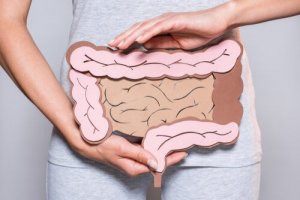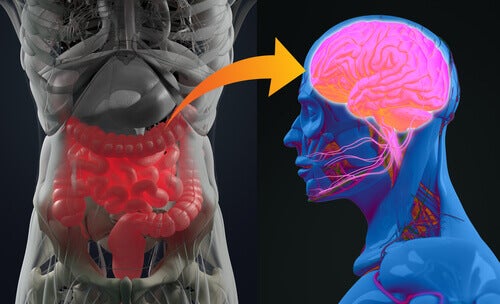Mental Digestion: A Possible Source of Intestinal Problems

The digestive system is very sensitive to emotional states. It isn’t strange for someone to get too surprised about something and vomit. Many people get a stomachache when they get nervous. Because of this fact, and also because slow intestinal performance is becoming a bigger problem in society, experts have begun to talk about “mental digestion”.
Remember that there’s a very close connection between the intestines and the brain. In this regard, it isn’t uncommon for people to call the intestines “the second brain”. The intestines work independently of the brain. In other words, they don’t need permission from the brain to do their functions.
The intestines obey the enteric nervous system (ENS). This is a division of the autonomic nervous system. It has its own neuronal circuits. However, it communicates with the brain through the sympathetic and parasympathetic nervous systems. This complex structure gives the mind and digestion a special connection. The concept of mental digestion springs from this connection.
“When I prayed for success, I forgot to ask for sound sleep and good digestion.”
-Mason Cooley-
Mental digestion
Experts identified a very close relationship between how you digest your thoughts and emotions and how you digest food. Thus, it’s very common for poorly absorbed experiences to be reflected in an increased difficulty absorbing foods. You could say that good intestinal digestion partially depends on good mental digestion.

The opposite thing also happens. In other words, digestive problems end up visibly altering your mood. That’s mostly due to the fact that your body processes 90% of serotonin in your digestive system and only 10% in your brain.
Remember that serotonin is a neurotransmitter. Thus, it has important effects on your mood. High serotonin levels can make you feel happy. On the other hand, a low level of the substance leads to depression.
As you can see, there’s a clear link between the digestion of food and mental digestion. One influences the other.
Constipation and mental digestion
One of the problems that’s most closely linked to mental digestion is constipation. This is a sign that you’re blocking ideas, emotions, or experiences from the past. Thus, what’s actually happening is that you’re holding on tightly to something and refuse to let it go.
It’s very normal for people with constipation to be engaged in rumination about the past. Their ruminating thoughts might be related to an old belief, goal, wound, or a material object.
The point is that this comes back to you time and time again without there being any change in your attitude. That’s why we can say that constipation is something that happens to people who tend to get obsessed over issues.
Sometimes, constipation is also related to words that you keep inside of you. Perhaps you haven’t expressed your opinions or feelings due to fear. Perhaps it’s out of a desire to avoid inconveniences. That silence becomes self-inflicted punishment that eventually turns into a digestive problem. This problem is also very common in people who’re always worrying about the future.
Diarrhea and emotions
Doctor Megan Rossi is an Australian specialist in intestinal health. She says that one of the main factors she observes in patients with intestinal problems is high stress levels.
She also claims that one of the best prescriptions for people who come to her for digestive problems is to meditate 10 to 15 minutes a day. This can end up having very positive health benefits.
Some experts claim that diarrhea is connected to the sudden rejection of an idea or feeling a person has had due to a decision they made. The mind reacts by trying to expel it as soon as possible. This is reflected in their body as constant evacuation. In other words, inadequate mental digestion ends up being reflected in insufficient digestion.

Diarrhea, from a mental and physical point of view, is the opposite of constipation. Diarrhea represents a desire to quickly discharge something because it causes rejection and blame. The person doesn’t want, can’t, or doesn’t know how to accept that part of themselves. So consequently, they end up expressing themselves physically.
Due to all of the above, it’s worth paying a little more attention to your digestive system. It might be showing you that you have emotional issues. All you have to do is explore and identify the emotions you haven’t been able to accept. Only then will you achieve correct mental digestion.
All cited sources were thoroughly reviewed by our team to ensure their quality, reliability, currency, and validity. The bibliography of this article was considered reliable and of academic or scientific accuracy.
De González Méndez, T. M. (2010). Psiconeuroinmunoendocrinologia, emociones y enfermedad. Una revisión. Revista MedULA, 18(2), 155-63.
This text is provided for informational purposes only and does not replace consultation with a professional. If in doubt, consult your specialist.








